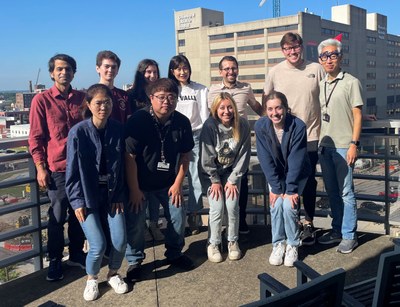Donghoon Chung, Ph.D.
 | Ph.D. |
Current Lab Members
Brian Alejandro - Research Manager
Jennifer Kreanzle - Research Manager
Eunjung Kim - Research Technologist, Sr.
Namkyung Kim - Postdoctoral Scholar
Jinjoo Kang - Postdoctoral Scholar
Deepak Singh - Postdoctoral Scholar
Ava Pignataro - Research Technologist
Sidney Goedecker - Research Technologist
Koji Barnaby - Research Technologist
Austin Krueger - Research Technologist
Previous Lab Members
Andrew Skidmore - Ph.D.
Priya Dhole - Postdoc
Jihye Kim - Research Associate
Scott Adcock - Research Associate
Brooke Armenta - Research Associate
Research Interest
The research focus of Chung lab is to understand the biology of viruses that infect brain (i.e., neurotropic viruses). The primary focus is on medically important positive strand RNA viruses such as Venezuelan equine encephalitis virus, Chikungunya virus, West Nile virus and Zika virus. During the last six years, the lab has discovered two novel antiviral compounds that inhibit these viruses with specific mechanisms of actions.
In order to develop these compounds as a preclinical therapeutic candidate, the lab is investigating 1) the antiviral mechanism of actions of the compounds at the molecular level and 2) the evaluation of in vivo antiviral activity of the compounds. This effort is supported by an R01 grant by NIH.
The lab is also studying how neurotropic viruses interact with the brain cells. With collaboration with Dr. Hetman’s group, the lab is studying how neurotropic virus invades the brains and what biological impacts neurotropic viruses make to the brain cells. The lab uses a variety of new in vivo and in vitro models to study the interaction between the neural cells and neurotropic viruses.
Selected Publications
- Kim, Jihye, Brian Alejandro, Michal Hetman, Eyas M. Hattab, Joshua Joiner, Horst Schroten, Hiroshi Ishikawa, and Dong-Hoon Chung. 2020. “Zika Virus Infects Pericytes in the Choroid Plexus and Enters the Central Nervous System through the Blood-Cerebrospinal Fluid Barrier.” Edited by Ted C. Pierson. PLOS Pathogens 16 (5): e1008204. https://doi.org/10.1371/journal.ppat.1008204.
- Skidmore, Andrew M., Robert S. Adcock, Colleen B. Jonsson, Jennifer E. Golden, and Dong-Hoon Chung. 2019. “Benzamidine ML336 Inhibits plus and Minus Strand RNA Synthesis of Venezuelan Equine Encephalitis Virus without Affecting Host RNA Production.” Antiviral Research, December, 104674. https://doi.org/10.1016/j.antiviral.2019.104674.
- Jonsson, Colleen B., Xufeng Cao, Jasper Lee, Jon D. Gabbard, Yong-Kyu Chu, Elizabeth A. Fitzpatrick, Justin Julander, Dong-Hoon Chung, Jennifer Stabenow, and Jennifer E. Golden. 2019. “Efficacy of a ML336 Derivative against Venezuelan and Eastern Equine Encephalitis Viruses.” Antiviral Research 167 (July): 25–34. https://doi.org/10.1016/j.antiviral.2019.04.004.
- Slomnicki, Lukasz P., Dong-Hoon Chung, Austin Parker, Taylor Hermann, Nolan L. Boyd, and Michal Hetman. 2017. “Ribosomal Stress and Tp53-Mediated Neuronal Apoptosis in Response to Capsid Protein of the Zika Virus.” Scientific Reports 7 (1): 16652. https://doi.org/10.1038/s41598-017-16952-8.
- Adcock, Robert S., Yong-Kyu Chu, Jennifer E. Golden, and Dong-Hoon Chung. 2017. “Evaluation of Anti-Zika Virus Activities of Broad-Spectrum Antivirals and NIH Clinical Collection Compounds Using a Cell-Based, High-Throughput Screen Assay.” Antiviral Research 138 (February): 47–56. https://doi.org/10.1016/j.antiviral.2016.11.018.
- Chung, Dong-Hoon, Jennifer E. Golden, Robert S. Adcock, Chad E. Schroeder, Yong-Kyu Chu, Julie B. Sotsky, Daniel E. Cramer, et al. 2016. “Discovery of a Broad-Spectrum Antiviral Compound That Inhibits Pyrimidine Biosynthesis and Establishes a Type 1 Interferon-Independent Antiviral State.” Antimicrobial Agents and Chemotherapy 60 (8): 4552–62. https://doi.org/10.1128/AAC.00282-16.
- Chung, D. H., C. B. Jonsson, N. A. Tower, Y. K. Chu, E. Sahin, J. E. Golden, J. W. Noah, et al. 2014. “Discovery of a Novel Compound with Anti-Venezuelan Equine Encephalitis Virus Activity That Targets the Nonstructural Protein 2.” PLOS Pathogens, no. 6 (June): e1004213. https://doi.org/10.1371/journal.ppat.1004213.